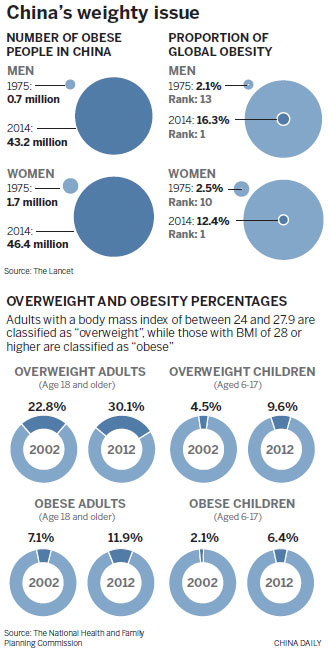 |
|
[Photo/China Daily] |
Standardized solutions
In April, leading health associations, including the Chinese Medical Doctor Association, issued a guideline to promote standardized solutions that help people lose weight.
The guideline covers the principles and methods that should be adopted not only to help people to lose weight, but also to keep it off. It is designed to encourage clinical nutritionists and medical staff to provide patients with standard weight-loss services in accordance with the rules, said Wang Qi, secretary-general of the China International Exchange and Promotive Association for Medical and Health Care.
Chen said there are a large number of commercial weight-loss treatments on the market, but many of them do not work and can even be harmful to health.
Although 5,000 to 10,000 weight-loss operations are performed in China every year, the actual number of obese people is far higher, according to Chen.
"Many obese people tend to stay at home and seldom go out," he said. "In this way they become fatter and fatter."
As the problem grows, the demand for weight-loss therapies, such as acupuncture and spa-based treatments, will continue to rise, he said.
According to the guideline, overweight people can slim down and maintain their proper weight by adhering to a few simple rules, such as eating a balanced diet and exercising properly, plus psychological intervention that can help maintain a positive mindset. It also notes that a healthy lifestyle is a long-term benefit.
Chen said the guideline has been promoted to major hospitals in Beijing and will be adopted by dozens of hospitals outside the capital by the end of July.
Leading experts from the China International Exchange and Promotive Association for Medical and Health Care are now providing training to doctors who offer weight-loss services in a number of hospitals outside Beijing to ensure they follow the guideline and provide standardized treatment to patients most at risk.
"The program is aimed at seriously obese people. Their condition has caused noticeable damage to their health," Chen said.
Yu Linxin, a marketing manager at E-Jane, a healthcare services provider in Beijing, said: "We have conducted marketing surveys and found that 95 percent of obese or overweight people have never visited a hospital for treatment. Many of them don't know that there are such clinics in hospitals, and most of them do not regard obesity as a disease."
She urged obese people to visit hospitals for approved weight-loss treatments: "Many methods used by service providers are not scientific. Some may help people lose weight temporarily - but they usually rebound quickly - and some may even cause health problems, such as malnutrition."